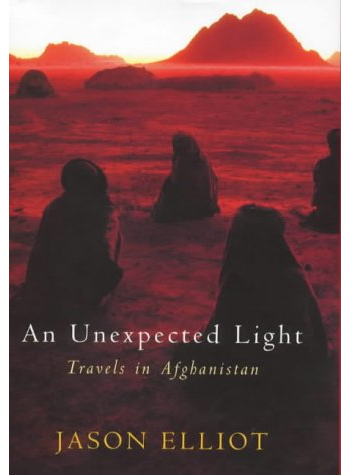 The covers of my edition of this book are littered with accolades from impeccable sources. A cynic might notice in the acknowledgements that Nobel-nominated author Doris Lessing appears to be a family friend and wonder whether Jason Elliot merely has good literary connections. Frankly, whether he does or not, this book is still outstanding and deserved to be published.
The covers of my edition of this book are littered with accolades from impeccable sources. A cynic might notice in the acknowledgements that Nobel-nominated author Doris Lessing appears to be a family friend and wonder whether Jason Elliot merely has good literary connections. Frankly, whether he does or not, this book is still outstanding and deserved to be published.
If timing is everything, then Elliot has it all. An Unexpected Light was first published in 1999, just two years before coalition forces invaded Afghanistan and ousted the Taliban government. Once again this economically poor but culturally rich country was headline news for all the wrong reasons. A rash of books appeared on the country, on the Taliban and on Osama bin Laden who is reputedly still hiding in the mountains somewhere. But for a thoughtful, sensitive, and insightful account of day-to-day life in the country; and an understanding of how Afghanistan worked between the end of the Soviet occupation and the start of the American-led invasion it’s hard to imagine a more accessible read than Elliot’s.
The book has two strands that interweave. Somehow (frustratingly it’s never really explained), Elliot was able to join the mujaheddin in the late 1980s as an intrepid if apprehensive teenager. He describes his time with these men as poignantly as any war correspondent – the ‘up close and personal’ account of small groups of men determined to fight for their country against the might of Soviet helicopter gunships. And so we leap back and forth to the main story: Elliot’s trip to the country in the late 1990s, to an Afghanistan amid civil war.
Elliot has a rare gift for storytelling. He evokes the spirit of the places he sees and the people he meets seemingly without effort; and the whole book is underpinned by his own perceptive thoughts into the events that unfold before him. As a Persian scholar he is able to set much of today’s problems in historical context and he brings to life the cultural heritage of the collection of peoples that form Afghanistan.
His time in Kabul is spent mostly with expats, some more annoying than others. He is a rare breed, a westerner almost without purpose. He clearly does some work as a journalist, but he is not a correspondent; he cares about the suffering he sees, but he is no aid worker. And all the time he is there the Taleban army gets closer to the heart of Kabul.
For me, the book comes into its own when Elliot leaves Kabul and explores other parts of the country; many of which were not really open to westerners. His stories of arduous truck rides, strange evenings in shared accommodation, and encounters with charity workers are all entertaining yet you are also left with a sense of Elliot’s courage and strong will. His description of the physical landscape are no less compelling – although at times throughout the book one feels that no adjective is left unturned. But readers would be hard pressed to finish the book without a desire to see for themselves the mountain ranges and ravinous valleys that we know today from the news for all the wrong reasons
If the book has a weakness it is simply its length. The descriptive passages start to drag towards the end; there is too little variation in pace and I started to feel that Elliot himself felt it was time to come home. This is a shame, because in many ways this is travel writing at its very best – certainly in the classic style of the genre; so to feel pleased when it’s over is unfortunate. One can imagine the tussle between editor and author as to what to keep and what to leave out but unquestionably tighter would have been better.
To many in the west, Afghans are still represented as a homogenous group of turban-wearing militia. This book reveals the generosity of spirit of so many of the people no matter who they ally themselves with. The contrast with a few of the westerners Elliot meets is striking. The very fact that Elliot survives this trip at all – let alone his first trip – is testament both to his cultural sensitivity and the kindness of so many Afghans. Read the book for that alone.
Overall verdict: Outstanding: should become a classic
Picador, 1999
